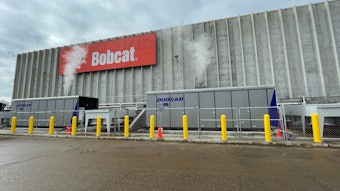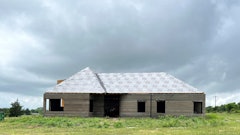
The Environmental Protection Agency (EPA) recently announced its grant selections. This news comes after the EPA launched the "Reducing Embodied Greenhouse Gas Emissions in Construction Materials and Products" grant program. With five large associations in the aggregate industry being selected, the hope is that the industry will be able to reach all sustainability goals set.
NRMCA
The National Ready Mixed Concrete Association (NRMCA) announced that the U.S. EPA has selected the association for a $9.63 million grant aimed at “Reducing Embodied Greenhouse Gas Emissions in Construction Materials and Products.” The grant will fund a five-year project managed by NRMCA and supported by its Build With Strength initiative which includes a team of concrete experts to educate the architectural and engineering communities on designing and specifying low-carbon concrete.
NRMCA President Michael Philipps expressed his gratitude toward the EPA for the opportunity to further enhance the concrete industry’s sustainability efforts.
He stated, “Our appreciation extends to the agency for acknowledging the significant contribution of our industry’s sustainability initiatives over the past two decades. As part of that effort, NRMCA has worked over the past 12 years to move the industry toward widespread adoption of Environmental Product Declarations. This grant is an investment in accelerating our efforts to move the industry toward low-carbon concrete solutions.”
To support the federal government’s goal of reaching net zero emissions in procurement by the year 2050, the EPA initiated this new grant program through the Inflation Reduction Act of 2022. Funding will empower U.S. companies to be competitive in securing federal and other institutional building projects. It also aims to stimulate job creation and broader economic benefits while promoting the cultivation of a workforce skilled in managing embodied carbon.
This project will help NRMCA accelerate its goal to cut the carbon footprint of concrete in half by 2028, using 2014 as a baseline, and to attain carbon neutrality by 2045, five years ahead of its original goal.
Through this five-year project, NRMCA proposes to increase the quantity and robustness of ready mixed concrete Environmental Product Declarations (EPDs) by providing grants to producers to create EPDs from an additional 3,000 plants (up from 1,500 currently). NRMCA plans to provide data quality management oversight and training as well as education for producers by training additional EPD verifiers and certifying up to 500 EPD specialists through an online education system. NRMCA also plans to enhance its existing low-carbon concrete tool and host five low-carbon concrete training workshops per year for five years. NRMCA will also work to improve the Product Category Rules (PCRs) for concrete and data availability for critical inputs, including cementitious materials, aggregates, and admixtures.
Lionel Lemay, NRMCA’s executive vice president of structures and sustainability, will manage the project. “These objectives are structured around distinct goals, accompanied by strategies and tasks tailored to achieve real carbon reductions,” he said. “Every objective is crafted to cater to the unique requirements of the concrete industry, with the overarching aim of achieving carbon neutrality in alignment with the objectives of the Inflation Reduction Act.”
Through this initiative, NRMCA will collaborate with various partners, including state ready-mixed concrete associations, material suppliers, and academic institutions such as the Massachusetts Institute of Technology (MIT). The grant will also focus on supporting smaller companies in remote areas, promoting geographic diversity in EPD development, and ensuring equitable workforce development by encouraging minority groups and women to become sustainability experts.
PCI, NPCA, and APCA
The U.S. EPA announced that it has selected the Precast/Prestressed Concrete Institute (PCI), the National Precast Concrete Association (NPCA), and the American Concrete Pipe Association (ACPA) to receive a $9.95 million grant in EPA’s "Reducing Embodied Greenhouse Gas Emissions for Construction Materials and Products" grant program.
The grant will focus on updating the associations’ existing product category rule (PCR) and producing product-specific environmental product declarations (EPDs), developing an EPD generator, and providing training and support to member companies for producing EPDs. The product also allows for creating EPDs under the current PCR while an update is conducted.
Each association will also use its portion of the grant to defray the cost for its producer members to create or update their EPDs for precast concrete products.
“We are very excited to have been selected by EPA to receive this grant,” said PCI President and CEO, Bob Risser. “The resources in this grant will allow us to create tools for generating EPDs that are specific to precast concrete and greatly accelerate our members’ ability to create them for their specific plants and products. By combining efforts, we will gain efficiency, and avoid duplication of efforts. Together, we can help all our members move toward manufacturing more sustainable concrete products.”
PCI’s participation in this grant is just one way that PCI and its members have promoted sustainable construction and design. The industry is committed to continuously improving the sustainable aspects of its products and processes to make a greater contribution to sustainability.
“I am thrilled to see PCI, NPCA, and ACPA selected with the EPA grant, highlighting the industry's commitment to sustainability,” said Becky King, PCI vice president of marketing and education. “Our dedication to promoting concrete’s role in sustainable practices continues to grow, and we look forward to advancing this important conversation with the EPA grant.”
NSSGA
The National Stone, Sand & Gravel Association (NSSGA) announced that it has been awarded a five-year, $9.65 million grant by the EPA. With the EPA grant funding and support, NSSGA aims to provide the aggregates industry with essential resources to:
- Robustly produce and release Environmental Product Declarations (EPDs)
- Establish guidelines on best management practices for reducing CO2 emissions
- Enhance the industry’s capacity to sequester CO2
"Thank you to the EPA and their staff for this important funding. We look forward to working together to enhance the transparency and availability of environmental impact data within the aggregates industry," said Michael Johnson, president and CEO of NSSGA. “The unwavering support from our members, industry partners, and 23 state associations has been instrumental in securing this grant and will be crucial as we move forward to accomplish the initiatives. This builds on our industry's robust efforts to be a leader in the carbon solution as we continually protect the environment and sustainably produce critically needed materials."
Over the next five years, NSSGA will engage its partners to create, train, and promote resources as the industry continues to be a beacon of sustainability. Key initiatives will include:
NSSGA Program Operator for Aggregates Industry
NSSGA to become program operator for aggregates industry - PCR and EPD. NSSGA will have full-time staff to administer the program, facilitate more robust updates, and ensure comprehensive oversight.
Digital Tools
Having access to digital tools and solutions will provide the aggregates industry with tools to transparently report the environmental impacts of their products.
Training Programs
In collaboration with state associations, universities, and other partners, NSSGA will provide comprehensive training programs, equipping industry professionals with the knowledge and skills needed to implement sustainable practices, perform life cycle assessments, and produce EPDs.
CO2 Reduction and Sequestration
The NSSGA will be setting best management practices for CO2 reduction and sequestration. Establishing and promoting guidelines that help the industry reduce its carbon footprint and also enhance its ability to sequester CO2 effectively.
The production of aggregates is an inherently low-carbon process, and member operations utilize various measures to reduce their energy use and carbon footprint. With this opportunity, NSSGA continues to promote sustainability within the aggregate industry.






























